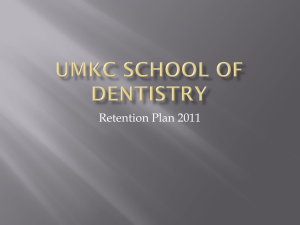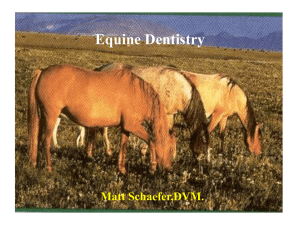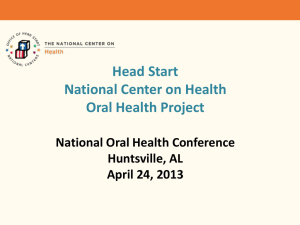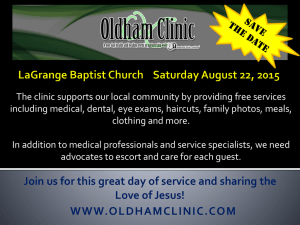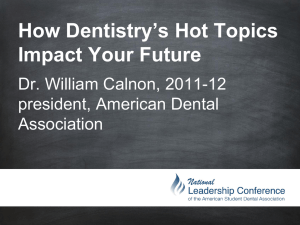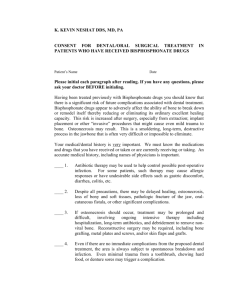INTERIM SPECIFICATION FOR MASTER OF DENTAL SURGERY
advertisement
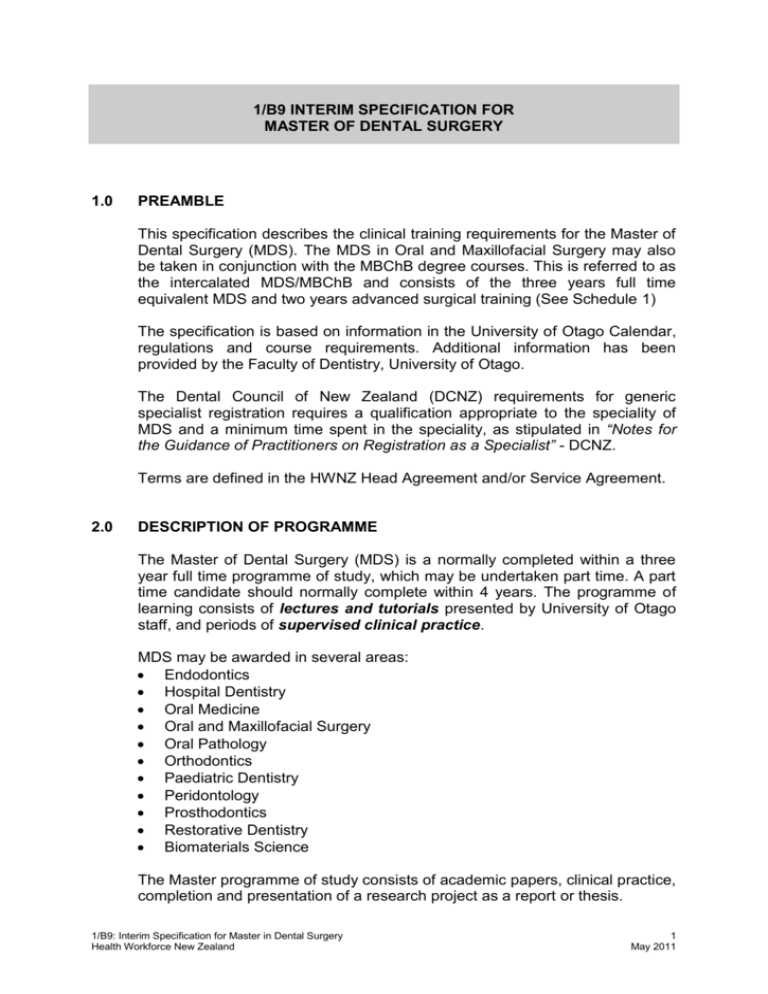
1/B9 INTERIM SPECIFICATION FOR MASTER OF DENTAL SURGERY 1.0 PREAMBLE This specification describes the clinical training requirements for the Master of Dental Surgery (MDS). The MDS in Oral and Maxillofacial Surgery may also be taken in conjunction with the MBChB degree courses. This is referred to as the intercalated MDS/MBChB and consists of the three years full time equivalent MDS and two years advanced surgical training (See Schedule 1) The specification is based on information in the University of Otago Calendar, regulations and course requirements. Additional information has been provided by the Faculty of Dentistry, University of Otago. The Dental Council of New Zealand (DCNZ) requirements for generic specialist registration requires a qualification appropriate to the speciality of MDS and a minimum time spent in the speciality, as stipulated in “Notes for the Guidance of Practitioners on Registration as a Specialist” - DCNZ. Terms are defined in the HWNZ Head Agreement and/or Service Agreement. 2.0 DESCRIPTION OF PROGRAMME The Master of Dental Surgery (MDS) is a normally completed within a three year full time programme of study, which may be undertaken part time. A part time candidate should normally complete within 4 years. The programme of learning consists of lectures and tutorials presented by University of Otago staff, and periods of supervised clinical practice. MDS may be awarded in several areas: Endodontics Hospital Dentistry Oral Medicine Oral and Maxillofacial Surgery Oral Pathology Orthodontics Paediatric Dentistry Peridontology Prosthodontics Restorative Dentistry Biomaterials Science The Master programme of study consists of academic papers, clinical practice, completion and presentation of a research project as a report or thesis. 1/B9: Interim Specification for Master in Dental Surgery Health Workforce New Zealand 1 May 2011 2.1 LEARNING ENVIRONMENT Papers are taken within an academic setting, consolidated by clinical experience and learning, via clinical supervision. Applied research must take place in a clinical environment where the relevance of the procedure to clinical care is understood. 2.1.1 Clinical Placements General requirements Clinical placements are in settings where the appropriate clinical experience can be obtained. These may include: Hospital secondary and tertiary care settings, Dental departments School of Dentistry Clinics The range of staff available to the student includes suitably qualified specialist dental surgeons who are registered with the DCNZ. The range of cases available for the student should be such that by the end of training, adequate range of experience has been gained as required by the University of Otago and the DCNZ. Students shall demonstrate an appreciation of contemporary Maori Health attitudes, beliefs and practices including knowledge and understanding of the Treaty of Waitangi as it applies to health service provision and to all aspects of clinical practice. Release from clinical duties should also be available for all students to attend the formal teaching sessions as outlined in Section 2.1.2. Normal lines of clinical service accountability and workplace safety shall apply to students. This includes the safety of both patients and staff. 2.1.2 Formal Teaching A formal teaching programme, delivered by appropriately skilled and experienced teaching staff is provided. This will consist of lectures, seminars, tutorials, clinical pathology sessions, evidence based biostatistics, case presentations and research. These will occur for 36 weeks of the year throughout the programme and will meet the curriculum requirements. Students will be required to attend the University of Otago Dental School for “in house” one week sessions and undertake 120 hours of distance learning programmes on selected topics. 1/B9: Interim Specification for Master in Dental Surgery Health Workforce New Zealand 2 May 2011 2.1.3 Access to Resources Access to general resources for training include: 2.2 Facilities in both academic and clinical settings for clinical meetings, case review and group teaching. Adequate library and search facilities including recognised texts and a relevant range of referred journals appropriate to Dentistry. Clinical support services, including qualified anaesthetic staff and comprehensive laboratory service relevant to the patients’ needs. Research facilities Dental assistant services as required. SUPERVISORS 2.2.1 Clinical Supervision Adequate clinical supervision requires the presence, on the premises, of a qualified dental specialist who is available and has sufficient time, to participate in procedures at the required level. Opportunities for directly supervised, indirectly supervised and monitored clinical practice should be provided according to the competence and experience of the student. Students are expected to meet with their consultant at least daily at the beginning of the training programme. In later years these meetings may be less frequent. Students will receive at least one hour of individual supervision per week for 36 weeks of the year. The content of the supervision provided will be predominantly clinical and it is expected that the supervisors will be responsible for all patients under the care of each student. Supervisors will be required to supervise most clinical work undertaken by the student, including observation of patient examinations. Students are required to keep a log book of their experiences as a requirement for registration with the Dental Council of New Zealand. This shall be reviewed by the clinical supervisor every three months. Supervisors shall: Ensure a wide range of cases are available to the student to gain broad experience and to meet the requirements of the training programme and assist the student to integrate theory and practice. Provide guidance on the development of attitudes, knowledge and skill objectives. Ensure the student has knowledge of and good practice in, medicolegal and ethical aspects of professional practice. 1/B9: Interim Specification for Master in Dental Surgery Health Workforce New Zealand 3 May 2011 Critically assess the standard of practice and the students’ clinical judgement regarding the need for assistance. Ensure that the principles of culturally appropriate care and the Health and Disabilities Service Commission’s Code of Patients’ Rights are applied to the practice of dentistry. Provide student with regular feedback on progress towards learning objectives. Provide reports to the education supervisor as required. Supervise clinical work, including observation of patient examinations and surgical procedures. Educational Supervision Educational Supervisors shall: 2.2 Prepare and apply valid and reliable assessment tools for both the academic and clinical aspects of the programme. Ensure students whose progress does not match expected standards of performance are given regular verbal and written feedback and provide opportunities for improvement. Ensure students receive assistance with their learning skills including preparation for examinations, how to learn from clinical experience, use clinical and academic supervision time effectively and direct their own learning. Regularly review the effectiveness of the formal teaching programme, including both content, delivery and assessment practices. Provide coaching of students as necessary, in their preparation for examination of surgical skills and clinical assessment. Ensure students receive guidance as necessary, with their thesis or research project to enable satisfactory presentation to the examiner. PROGRAMME CO-ORDINATION This role may be undertaken by the education supervisor and shall: Co-ordinate the Master training programme to ensure all requirements for theoretical learning and clinical experience are met. Provide students with curriculum documents. Direct the placement of students and the allocation of clinical supervisors in consultation with the clinical experience provider and the student. Ensure access to the formal teaching programme. Ensure clinical supervisors have the necessary training and support, and are clear about their supervision role Regularly evaluate students’ clinical training experience (6 monthly) and keep records of their progress throughout the training programme. Ensure students whose progress does not match expected standards are given regular verbal and written feedback. 1/B9: Interim Specification for Master in Dental Surgery Health Workforce New Zealand 4 May 2011 2.3 Implement a quality plan to monitor the effectiveness of the entire programme (formal teaching and clinical experience). Report to the HWNZ in a timely and effective manner. EXPECTED OUTCOMES Award of the Master in Dental Surgery by completion of the course requirements. Specialist registration with the DCNZ. Refer “Notes for the Guidance of Practitioners on Registration as a Specialist” – DCNZ. 3.0 ELIGIBILITY 3.1 STUDENT ELIGIBILITY Students shall: 3.2 Hold DCNZ registration as a dentist; and Be a New Zealand Citizen; or Hold a New Zealand residency permit as conferred by New Zealand Immigration Service; and Meet entry requirements to the MDS programme of the University of Otago. Students who do not meet the above criteria may be considered on a case by case basis. PROVIDER ELIGIBILITY At present the University of Otago is the accredited educational provider for this training in New Zealand. Clinical providers must be approved by the Faculty of Dentistry, University of Otago. Some providers may offer limited training in specified areas and be eligible for partial training only. 4.0 LOCATION AND SETTING The formal teaching component of the training programme is predominantly provided by the University of Otago at its Dunedin facilities. Clinical training is to be provided in approved training posts as listed in Schedule 1. Any secondment of a student to another location for further training experience must comply with Part 9 of the HWNZ Head Agreement. 1/B9: Interim Specification for Master in Dental Surgery Health Workforce New Zealand 5 May 2011 5.0 ASSOCIATED LINKAGES Links should be established with: 6.0 The Dental Council of New Zealand Patient Advocates for the Code of Health and Disability Services, Consumer Rights and Privacy issues Other relevant organisations (For example, New Zealand (NZ) Dental Association, The Royal Australasian College of Dental Surgeons, relevant NZ Specialist Dental Societies, NZ Dental Hygienists’ Association etc.) PURCHASE UNIT An eligible student enrolled in the Master of Dental Surgery (MDS). Refer Section 3.1 above. Part time students who are funded under this contract will be funded on a prorata training unit basis. 7.0 QUALITY STANDARDS PROGRAMME SPECIFIC This section should be read in conjunction with Schedule 1 Part 3 of the HWNZ Head Agreement, which specifies the generic quality standards for all programmes provided under this contract. The provider will ensure that: 8.0 There are links into a formal teaching programme, which includes specific preparation for examinations. Students receive assistance with their learning skills, including how to learn from clinical experience, use supervision time effectively and direct their own learning so as to develop life long learning skills. Teaching staff who have appropriate skills and experience to provide a formal teaching programme. Processes are in place to monitor the quality of the clinical programme and the formal teaching programme. Protocols and procedures for working with students and supervisors who require additional support are utilised. REPORTING REQUIREMENTS PROGRAMME SPECIFIC This section should be read in conjunction with Schedule 1 Part 1 of the HWNZ Head Agreement, which specifies generic reporting requirements for all programmes provided under the Contract. 1/B9: Interim Specification for Master in Dental Surgery Health Workforce New Zealand 6 May 2011 8.1 PROGRESS REPORTING Section 2.4 of the specification details the expected outcomes of the training programme purchased. 8.2 QUALITY REPORTING Reports as described in Schedule 1 Part 1 of the HWNZ Head Agreement require a summary of the programme. Schedule 1 Part 3 of the HWNZ Head Agreement requires that you have a quality plan in place for the ongoing monitoring of the training provided. The summary should refer to the outcomes of this internal quality management and make reference to the service specific quality standards in Section 7.0 above, particularly supervision. 1/B9: Interim Specification for Master in Dental Surgery Health Workforce New Zealand 7 May 2011 SCHEDULE 1: CONJOINT/ INTERCALATED MASTER IN DENTAL SURGERY AND MAXILLOFACIAL SURGERY INTERCALATED SPECIALTY: University of Otago MDS/MBChB Conjoint Training Programme Dental Council of New Zealand Medical Council of New Zealand DURATION: 5 Years CONTENT: Learning Environment Experience by the student consists of a conjoint programme run over five years. The 1st and 4th years of the programme are full time MDS years. The 2nd and 3rd years of the programme are full time MBChB years with students entering the MBChB course in its 4th year. The final year of the programme will be a joint year. The following Intercalated MDS/MBChB outcomes by year of training are as follows: Year MDS Course 1 ORAM 801 2 ORAM 802 ORAM 803 MBChB Course Examination Schedule ORAM 801 4th Year Medicine ORAM 802 4th Year Medicine 5th Year Medicine 5th Year Medicine Sites Dunedin Dunedin/ Christchurch (cross credited from MBChB) 3 4 5 Dunedin/ Christchurch Dunedin/ Christchurch ORAM 804 ORAM 804 ORAM 880 ORAM 880 (Incomplete – examine at end of Year 5) ORAM 805 Dunedin/ Christchurch ORAM 880 3 months MBCHB at 6th Year Medicine approved sites ORAM 805 6th Year Medicine 1/B9: Interim Specification for Master in Dental Surgery Health Workforce New Zealand 8 May 2011 Clinical Placements Trainees will be rostered as part of clinical training to OMS on-call in years 1 and 4 of the course. Levels of on-call will vary and may include periods of up to 10 weeks where two medical rotations with extensive on-call or assessment requirements occur one after the other (e.g. anaesthesia rotation). The OMS on-call regulations are set out in Proposed Joint MDS/MBChB Programme for Trainees in Oral and Maxillofacial Surgery – 20 July 1998 by Graduate Studies Committee of the Faculty. In addition to the requirements outlined in Section 2.1.1 of the specification, placements require two years of surgical experience in a specialist centre to include: Clinical experience in the operative management of facial trauma. Clinical experience in the assessment of acute oral and maxillofacial problems through involvement in an on-call rota. Eligibility Trainees shall: Hold DCNZ registration as a dentist. Be permanent New Zealand residents, as conferred by the New Zealand Immigration Service. Meet entry requirements to the MDS/MBChB programme of the University of Otago as stipulated in Proposed Joint MDS/MBChB Programme for Trainees in Oral and Maxillofacial Surgery – 20 July 1998 Trainees who do not meet the above criteria may be considered on a case by case basis. Associated Linkages Dental Council of New Zealand Medical Council of New Zealand Australian and New Zealand Society of Oral and Maxillofacial Surgeons (ANZSOMS) Royal Australasian College of Dental Surgeons 1/B9: Interim Specification for Master in Dental Surgery Health Workforce New Zealand 9 May 2011
